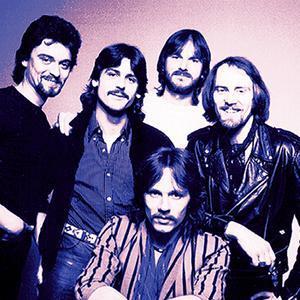
Eloy
by Geoff Orens\r One of the most popular German bands of the 70s, Eloy went through several stages in their long career, with the only constant member being guitarist/vocalist Frank Bornemann. Transforming from a political-themed hard rock band to a spacey progressive rock band who sounded something like a mix of Jethro Tull and Pink Floyd, the group in later formations would move toward a more accesible hard rock sound with strong progressive elements. \r \r Eloy was formed in 1969 by Frank Bornemann (guitar, harmonica, percussion), Erich Schriever (lead vocals, keyboards), Manfred Wieczorke (guitar, bass, vocals), Helmuth Draht (drums), and Wolfgang Stcker (bass). Taking their name from that of a human race in the book Time Machine by H.G. Wells, the band released their first single, Daybreak, in 1970 and put out their eponymous debut album the following year. Filled with conventional hard rock with political statements, the album is an anomaly in the bands catalogue. Schriever, who was responsible for the bands political lyrics, left the group after Eloys debut, as did Draht, who was replaced by Fritz Randow.\r \r Inside, released in 1973, consolidated the group as a full-on progressive rock-styled outfit. After the album, which fared decently, Stcker left the band, to be replaced by Luitjen Janssen. Floating (1974) and Power and the Passion increased Eloys reputation and success, and the latter record was recorded with second guitarist Detley Schwaar. It was also the groups first concept album. The band then broke up in 1975, with some members of the group wanting to continue to write spacey progressive rock concept albums, while others wanted a more restrained approach. \r \r Eloy resurfaced in 1976 with Bornemann as the producer and mastermind behind the band, who featured new members Klaus-Peter Matziol (bass, vocals), Detlev Schmidtchhen (keyboards, vocals), and Jürgen Rosenthal (drums, vocals). With this lineup, Eloy became the best-selling German act of their time, with increasingly ornate concept albums such as Dawn (1976) and the spacey Ocean. 1978 saw the release of Eloy Live and 1979s Silent Cries and Mighty Echoes was the bands highest-selling record.\r \r Schmidtchhen and Rosenthal then left the group to go solo and were replaced by Hannes Folberth and Jim McGillveray, respectively. Eloy also added guitarist Hannes Arkona. The new lineup released Colours in 1980, which saw the band start to abandon their spacey elements to pursue a more hard rock sound. 1981s Planets and 1982s Time to Turn were two parts of a science-fiction concept album that found the groups sound increasingly dominated by keyboards. The band released Performance and Metromania in 1984 and then split due to musical differences after a series of farewell concerts in England.\r \r Eloy returned in 1988, this time as a duo featuring Bornemann and multi-instrumentalist Michael Gerlach. The first Eloy record with this lineup was Ra, which saw a return to the sound of Colours. It was followed by Destination (1992). Both records did quite well on the German charts. Several members of Eloy re-formed in 1993 to re-record older tracks for Chronicles I, followed by Chronicles II the next year. In 1994, the band recorded The Tides Return Forever, which featured the return of Klaus-Peter Matziol. 1998 saw the trio release Ocean 2: The Answer with new drummer Bodo Schopf .\r
